The Epson EpiqVision Ultra LS300 is a 1080p LCD laser projector. It's an ultra-short-throw (UST) projector, so it's capable of projecting content at an extremely short distance from the screen or wall: it projects a 61" image at a distance of 1" and up to a 120" image at a distance of 15.2". It has two HDMI ports, one of which doubles as the ARC port, and has 1080p @ 60Hz support and an integrated 2.1 Yamaha sound system with two full-range 5W speakers and a 10W subwoofer. It has Bluetooth and Wi-Fi support and comes with the Android TV smart interface with full Chromecast integration.
Our Verdict
The Epson LS300 is good for watching movies. It's very bright, so it performs well in bright rooms. While it doesn't have a wide color gamut, colors pop due to the projector's brightness. Its contrast is alright, so its blacks are slightly raised when viewed in a dark room. The LS300's color accuracy is excellent overall without any calibration, which is good because the projector doesn't have any white balance or color calibration. Unfortunately, the projector is very noisy, so you can hear it easily over most audio feeds.
- Very bright.
Excellent color accuracy nearly out of the box.
- Has a full suite of smart features with Wi-Fi and Bluetooth.
Ultra-short-throw projector that can be placed very close to the wall or screen.
Contrast is great in mid-bright content.
- Doesn't have any calibration features for color accuracy purists.
Fan is extremely loud.
Contrast is quite poor in near dark scenes.
As a living-room UST, the Epson LS300 brings some gamer-friendly traits: bright picture, decent colors, and it accepts a 4k60 signal, which it downscales to 1080p. Unfortunately, its responsiveness sinks the experience, as its input lag is terrible, there's no Game Mode, no 120Hz, and no true 4k capability. That level of delay feels sluggish in essentially every genre, even casual titles. It's also very noisy, so you can easily hear it over most audio feeds.
- Very bright.
Excellent color accuracy nearly out of the box.
- Has a full suite of smart features with Wi-Fi and Bluetooth.
Ultra-short-throw projector that can be placed very close to the wall or screen.
Contrast is great in mid-bright content.
- Doesn't have any calibration features for color accuracy purists.
Terrible input lag leads to sluggish gameplay.
Limited to 60Hz.
Fan is extremely loud.
Contrast is quite poor in near dark scenes.
The Epson LS300 has fantastic brightness. It's easily bright enough to be used in rooms with a few lights around, and it has excellent brightness uniformity, with very little vignetting.
- Very bright.
The Epson LS300's contrast is okay. It does well in mid-bright content, which is good for most content. Unfortunately, it really struggles in very dark content, like when watching horror movies, and it doesn't excel in extremely bright content either.
Contrast is great in mid-bright content.
Contrast is quite poor in near dark scenes.
Changelog
-
Updated Feb 06, 2026:
We've modified the text in our Brightness and Native Contrast text boxes as a result of our latest test bench. We've also added Brightness and Contrast performance usages in the Verdict section.
- Updated Feb 03, 2026: We've converted the review to Test Bench 0.11, which renames our Contrast test to Native Contrast, and adds a Sequential Contrast test box. We also added new Brightness and Contrast performance usages in Our Verdict. See the 0.11 changelog.
-
Updated Nov 07, 2025:
We've added Imaging, Optics, Noise, Supported Resolutions, HDR Format Support, 3D, Input Lag, and Audio Passthrough boxes as a result of our latest test bench. We've also added a Gaming usage in the Verdict section.
- Updated Oct 30, 2025: We've converted the review to Test Bench 0.10, which updates our Design tests, and adds a whole new suite of Inputs tests. We also added new gaming-oriented usage scores in Our Verdict. See the 0.10 changelog.
Check Price
Differences Between Sizes And Variants
We bought and tested the Epson EH LS300W. This projector has no variants, but Epson has other projectors in their EpiqVision line, like the Epson EpiqVision Flex CO-W01 and Epson EpiqVision Mini EF12. This projector also has a higher-tier model, the Epson EpiqVision Ultra LS800. The higher-tier model projects sharper images due to its pixel-shifting technology, and it's also capable of projecting 1080p @ 120Hz, which is great for gamers.
| Model | Type | Native / Processing | Light Source |
|---|---|---|---|
| Epson EpiqVision Ultra LS300 (tested) | UST (ultra-short-throw) | 1080p (no pixel-shift) | Laser (3LCD) |
| Epson EpiqVision Ultra LS800 | UST | 4k PRO-UHD pixel-shift | Laser (3LCD) |
| Epson EpiqVision Mini EF12 | Portable (standard throw) | 1080p | Laser (3LCD) |
| Epson EpiqVision Flex CO-W01 | Portable / room-to-room (standard throw) | WXGA (1280×800) | Lamp (3LCD) |
Our unit was made in the Philippines.
Popular Projector Comparisons
The Epson EpiqVision Ultra LS300 projector is quite good. It's expensive and is limited to 1080p output, but it's bright, very color-accurate, and comes with a full slate of smart features. The LS300 is an ultra-short-throw projector, so it can project a large image at a short distance from the screen. Still, if you're not cramped for space, other products offer better image quality for a similar or cheaper price. Plus, this is a miss for gamers, as its input lag is terrible at all resolutions, there is no 120Hz mode, and no Game Mode to help reduce the latency.
See our recommendations for the best projectors for home theater, the best home projectors, and the best short-throw projectors.
The Epson EpiqVision Ultra LS300 and Epson EpiqVision Ultra LS800 are very similar projectors, with the main difference being that the LS300 is limited to 1080p @ 60Hz on its two HDMI ports. In comparison, the LS800 is a 4k pixel shift projector capable of up to 4k @ 60Hz on its three HDMI ports and 1080p @ 120Hz on its third port. This means that the LS800 also projects a sharper image overall, but the LS300 is much more accurate out of the box.
The Epson Home Cinema 3800 is better than the Epson EpiqVision Ultra LS300, although the LS300 has more connectivity options and smart features. The LS300 is also an ultra-short-throw projector, so you can install it very close to the screen. Still, the Home Cinema 3800 is a 4k projector (with pixel shift), is a bit brighter, has better contrast, and is noticeably more color-accurate after calibration, so it's the better-looking of the two projectors.
The Epson EpiqVision Ultra LS300 is better than the Hisense PX1-PRO for watching movies. They're both ultra-short-throw projectors, but the Epson is significantly brighter, with much better pre-calibration accuracy. The Hisense has a much wider color gamut, but can't emphasize its colors due to its low brightness. The Hisense is a 4k projector with HDMI 2.1 ports, while the Epson is limited to 1080p, so the Hisense is enticing for gamers. Still, it's not bright enough to provide a graphically pleasant experience.
The Epson EpiqVision Ultra LS300 is better than the Samsung The Premiere LSP7T. The Epson is limited to 1080p, while the Samsung is a 4k projector with pixel shift. Still, the Epson makes up for it with a vastly brighter image, and is extremely accurate without needing to be calibrated. It's also more versatile as it can project on more screen sizes and at a shorter distance than the Samsung.
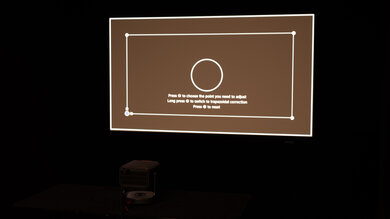
We've independently bought and tested over 60 projectors, and we've published all the detailed results for each so you can decide which one to buy. These have all been tested under the same standardized methodology, allowing you to compare them side by side. We still have all these projects in our lab so we can continually go back and compare them to ensure our reviews are still accurate. All our test methodology is also public on our website, so you can validate the results yourself.
Throw Calculator
Global Controls
Test Results

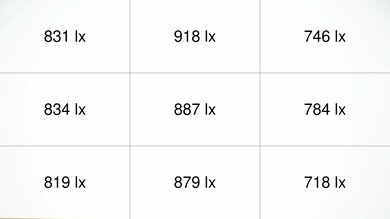
This Epson EpiqVision LS300's peak brightness is fantastic. It's extremely bright, can easily be used in a room with a few lights, and it has excellent brightness uniformity to boot; you'll notice some vignetting, but it's minor.
The table below lists the projector's other uncalibrated picture modes. The 'Dynamic' Picture Mode is extremely bright and vibrant, but is also very inaccurate.
| Picture Mode | White Light Output (WLO) | Color Light Output (CLO) |
|---|---|---|
| Dynamic | 3,673 lm | 3,727 lm |
| Vivid | 2,193 lm | 2,270 lm |
| Bright Cinema | 2,217 lm | 2,427 lm |
| Cinema | 2,204 lm | 2,424 lm |
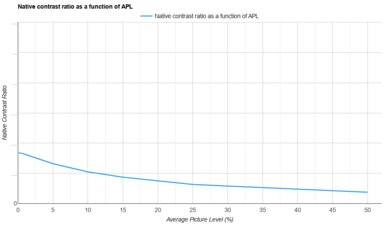
The Epson EH LS300W has okay contrast, so it looks fine when watching content in a dark room. Still, it struggles with near-dark content, with noticeably raised blacks. It performs better in mid-bright content, although not so much with very bright content. Overall, if you'd prefer a projector with better contrast, look up the BenQ X500i instead.
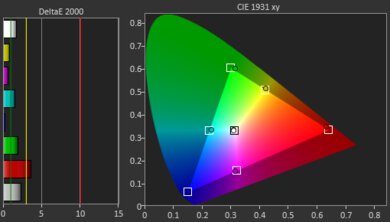
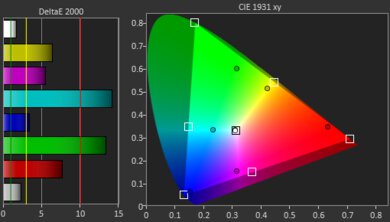
The projector has a decently wide color gamut. It does an excellent job with the Rec. 709 color space, which is used with SDR content. Unfortunately, it doesn't display the wider Rec. 2020 color space very well.
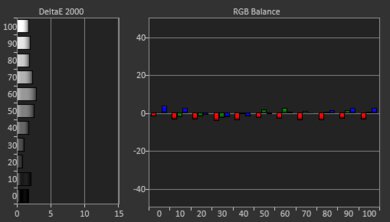
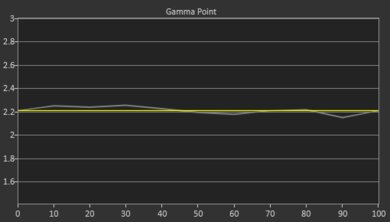
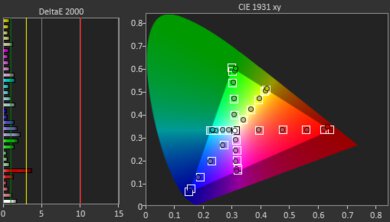
The projector has excellent pre-calibration accuracy. The white balance is great, with only very minor accuracy errors, and its color accuracy is fantastic. Its color temperature is a tad on the cold side, giving everything a slight blue tint.
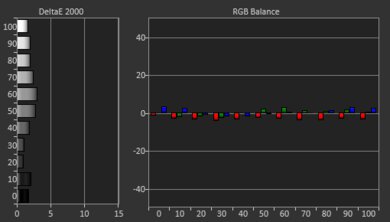
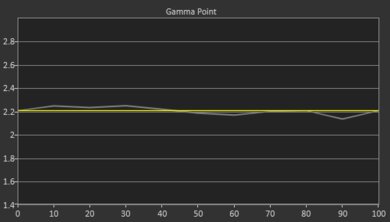

The Epson EH LS300 doesn't have white balance or color calibration, and modifying the contrast/brightness or color temperature doesn't yield any improvement. Thankfully, the projector is very accurate without needing to be calibrated.
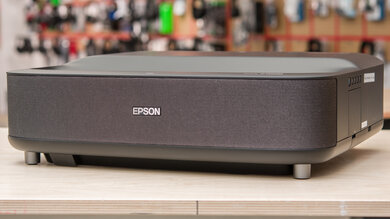
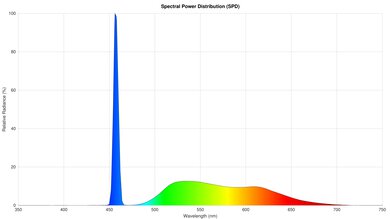
This ultra-short-throw Epson LS300 projector uses a 3LCD light engine with a laser-phosphor source, so there's no color wheel and no risk of rainbow artifacts. Its light source requires no maintenance and will last for 20,000 hours or more. You likely won't ever have to worry about replacing it.
As an ultra-short-throw model, the Epson LS300 uses a fixed lens with no optical zoom, so image size is set almost entirely by how far the chassis sits from the wall, which is very close on this model. Focus is manual, there's no lens shift, and only manual keystone is available. For precise sizing and placement, use our Throw Calculator.
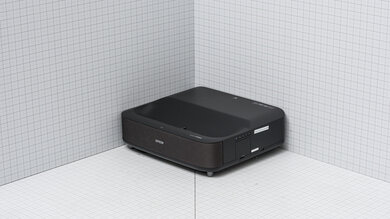
The Epson LS300 isn't meant to be portable as it's a big and heavy projector, and it lacks an integrated battery, so you need to plug it in. The projector lacks auto keystone correction, so you'll need to adjust the image manually, and it also doesn't have autofocus. It does have an integrated 2.1 speaker system, so you won't need to worry about connecting it to a soundbar if you do move it.
This UST runs loud. At maximum brightness, it sounds like a constant high-flow fan, kind of like a relatively subdued vacuum cleaner, and it's clearly audible in quiet scenes. Its front-of-room placement means there's little to block that noise, though the distance to the sofa helps a bit versus a projector sitting right beside you. Overall, keep in mind that you'll hear this projector easily in most contexts.
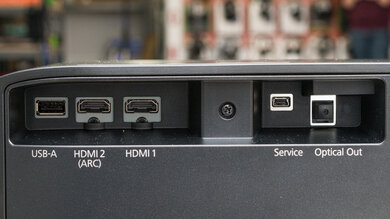
The Epson LS300 projector keeps things simple for hookups. You get two HDMI 2.0 ports, with ARC on HDMI 2 for sending audio to a soundbar or AVR, but there's no HDMI 2.1. A single USB-A port handles basic media playback or 5V power, and there's optical digital audio out if you prefer Toslink. There's no 3.5 mm analog audio out and no Ethernet jack, so networking is Wi-Fi only. A mini-USB Service port is also present for maintenance.
The Epson EpiqVision LS300 offers a ton of different resolutions, but it doesn't support any refresh rate above 60Hz, and it doesn't have a Game Mode.
The Epson EpiqVision Ultra LS300 is extremely slow. There's no Game Mode and no 120Hz, so you can't reduce its latency. The delay is noticeable in every game genre, so this projector is for video playback only, not for gaming.
This projector is ARC only (no eARC). Over HDMI ARC, it can pass Dolby Digital 5.1 and DTS 5.1, and it supports Dolby Atmos when carried in DD+. There's no DD+ 7.1, no multichannel LPCM (stereo 2.0 only), and no lossless formats like TrueHD/Atmos, DTS-HD MA, or DTS:X, so keep that in mind when organizing your audio setup. Overall, this projector works great when paired with a classic DVD setup, but is rather limited for high-end audio when paired with an Ultra HD reader. The optical output mirrors ARC: DD 5.1/DTS 5.1 only.
The projector has Android TV built-in, and it's smooth and fast to use with a ton of available apps. The projector has full Chromecast integration, so you can play content from your phone directly on the projector. Finally, the projector has an integrated 2.1 speaker setup from Yamaha, with two full-range 5W speakers and a 10W subwoofer.

